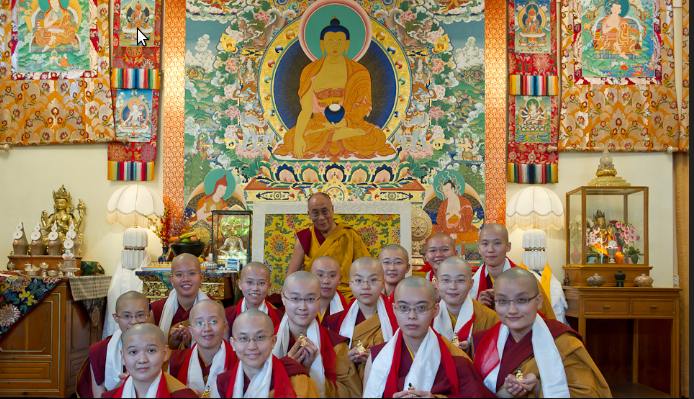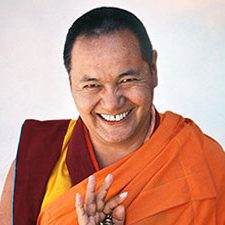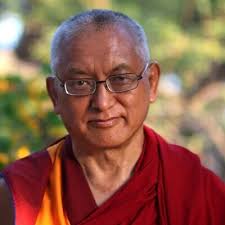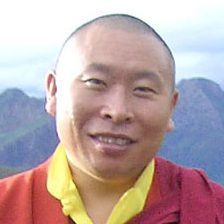

His Holiness the 14th Dalai Lama

“Having taken ordination we must constantly remember that the primary reason for holding vows as a nun or a monk is to be able to dedicate ourselves to the practice of the Dharma. Even if only a few individuals try to create mental peace and happiness within themselves and act responsibly and kind-heartedly towards others, they will have a positive influence in their community. As well as being equally capable, women have an equal responsibility to do this…No matter how difficult or complicated it may be at the beginning, if we keep up our spirit and determination, with wisdom eventually any difficulties or obstacles can be overcome. I am quite sure that so long as the interest and spirit remain, you can make great contributions for the Buddhadharma and for the benefit of sentient beings.”
Throughout history there have been individual nuns who rose to eminence, beginning of course with Mahaprajapati. Whatever other qualities they may have had, these women revealed remarkable determination and courage. They were single-minded in the pursuit of their chosen goal, without regard for encouragement or disappointment. I urge you, both as individuals and communities, to adopt a similar approach.
– His Holiness the Dalai Lama

Jetsunma Tenzin Palmo
“Monasticism is wonderful for some people, but it is not for everybody, nor should it be. It exists for that small group of individuals who are drawn toward the ideal of a life totally dedicated to the Dharma through the renunciation of worldly concerns and through ethical purity. As we all know, modern society is based principally on greed and promotes the view that happiness depends mainly on acquisition and the satisfaction of desire. Sex and violence rage everywhere nowadays. In contrast, the sangha is a group of monastics whose lives are based on renunciation, purity, restraint, and discipline, all of which are aimed at reducing our wants and desires.”

Bhikshuni Thubten Chodron
“Yes, we western sangha have to learn to be self-reliant and strong internally in order to keep our precepts. We also have to learn how to be part of a community and to give up constantly focusing on MY Dharma practice and what’s best for MY path to enlightenment. Internally strong and confident monastics, who know how to love, share, take care of, and support each other—it’s a tall call but how wonderful and beneficial it will be to become like that.”

Lama Thubten Yeshe
“Even though we have developed a certain degree of renunciation, we still have our problems; we’re not yet arhats or buddhas. We need to take care of each other emotionally. It is difficult for lay people to understand why Sangha get emotionally upset: ‘They’ve renounced samsara, what are they crying for?’ Monks and nuns understand…You people need to get organized, work together, help each other. This is very, very necessary. Monks and nuns need to be properly educated; without getting organized, this will not be possible.”

Lama Zopa Rinpoche
“For most people the best is to do retreat…But of course, if one’s mind is strongly stabilized there is no problem doing social work. Some Sanghas who studied for a long time and then went into solitary retreat have told me that what gave them the most satisfaction was retreat; they discovered unbelievable meaning and benefit from doing retreat…there are all these studies and things to do in life, but there’s also your heart to take care of; you need to fill up what is empty. This is especially important for Western people…the feeling of the heart, satisfaction of the heart, is very important, otherwise they cannot continue living in ordination, it becomes more and more uncomfortable…”

Wangdrak Rinpoche
“When foreigners ordain, they leave home in renunciation and begin a new life. From then on it’s not comfortable to live with one’s family and it’s awkward wearing the red robes in public; people look down on monastics for not working usual jobs. Rather than obtaining simpler, conducive conditions for Dharma practice through ordaining, the environment itself becomes an adverse condition to their aspirations for full time practice and study.
I truly believe it is greatly beneficial for society to support the sangha in their special commitment to the Dharma, and I hope and pray that there will be increasing support for the foreign sangha in Tibetan Buddhism.”
Any Doubts?
If we didn’t answer all of your questions, feel free to drop us a line anytime.
